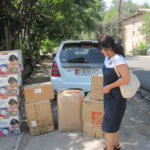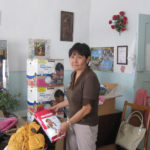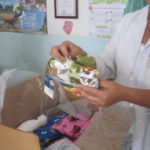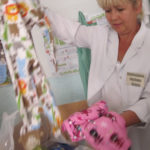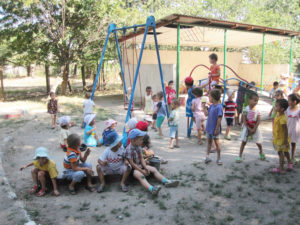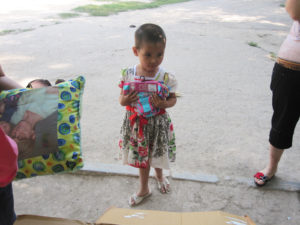Orphanage Donations
Early in 2013, KCF’s representative in Bishkek met with the directors at the Bishkek and Tokmok Baby Houses, and Ak Beshim Orphanage, regarding their needs. We then collected funding for their specific requests, as well as clothing, shoes, and toys from families in the USA. Kyrgyz Children’s Future obtained permission to ship the items free-of-charge, using free space aboard U.S. military aircraft that were heading to Bishkek in April and July of 2013.
Our representative then made deliveries to 3 orphanages, the Baby House in Tokmok, the Ak-Beshim Orphanage for older children, and for the first time, to Belovodskoe for children ages 4 and up.
Washing Machine for Ak-Beshim Orphanage
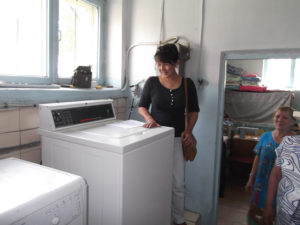 For Ak-Beshim, we used funds from KCF’s donors to purchase a heavy-duty 220-volt, 50-cycle (Hertz) washing machine from Speed Queen in the United States, which costs much less than comparable European models in Kyrgyzstan. The washer was transported to Kyrgyzstan using available space in a military aircraft in April 2013. KCF’s Representative delivered it to the Ak-Beshim orphanage with the help of the U.S. Army.
For Ak-Beshim, we used funds from KCF’s donors to purchase a heavy-duty 220-volt, 50-cycle (Hertz) washing machine from Speed Queen in the United States, which costs much less than comparable European models in Kyrgyzstan. The washer was transported to Kyrgyzstan using available space in a military aircraft in April 2013. KCF’s Representative delivered it to the Ak-Beshim orphanage with the help of the U.S. Army.
Thanks to everyone who contributed!
Books in Braille
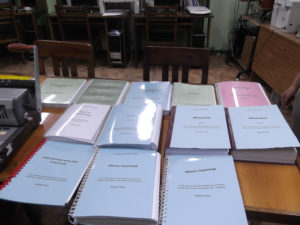 In 2013, Kyrgyz Children’s Future (KCF) completed a pilot project to emboss the very first Braille books in the Kyrgyz language. We embossed 14 different titles into Braille (including fairy tales for children and works by Chingiz Aitmatov), and provided a total of 28 books to:
In 2013, Kyrgyz Children’s Future (KCF) completed a pilot project to emboss the very first Braille books in the Kyrgyz language. We embossed 14 different titles into Braille (including fairy tales for children and works by Chingiz Aitmatov), and provided a total of 28 books to:
- the Osh Residential School for the Blind, in Osh, Kyrgyzstan
- the National Specialized Library of the Kyrgyz Society for the Blind and Deaf (Republikanskaya Spetzializirovannaya Biblioteka Kyrgyzskovo Obshchestva Slepykh I Glukhikh) in Bishkek, which is a free library serving blind readers of all ages, open to all residents of Kyrgyzstan.
We arranged for the embossing to be done within Kyrgyzstan.
This project came about as we had received several requests to assist education for the blind in Kyrgyzstan, and it fits within our mission. KCF first consulted with experts in education for the blind in the USA and researched the needs of the two residential schools for blind children in Kyrgyzstan, in Osh and in Bishkek. We found that teaching of reading and writing in Braille is seriously handicapped in Kyrgyzstan by the lack of materials. In fact, there were no Braille books in the Kyrgyz language. Yet reading and writing in Braille are critical skills for enabling blind children to integrate themselves into a more normal life.
If this project generates more interest and demand from the children and their teachers for more literature in Braille, we will consider making or buying additional Braille books.

